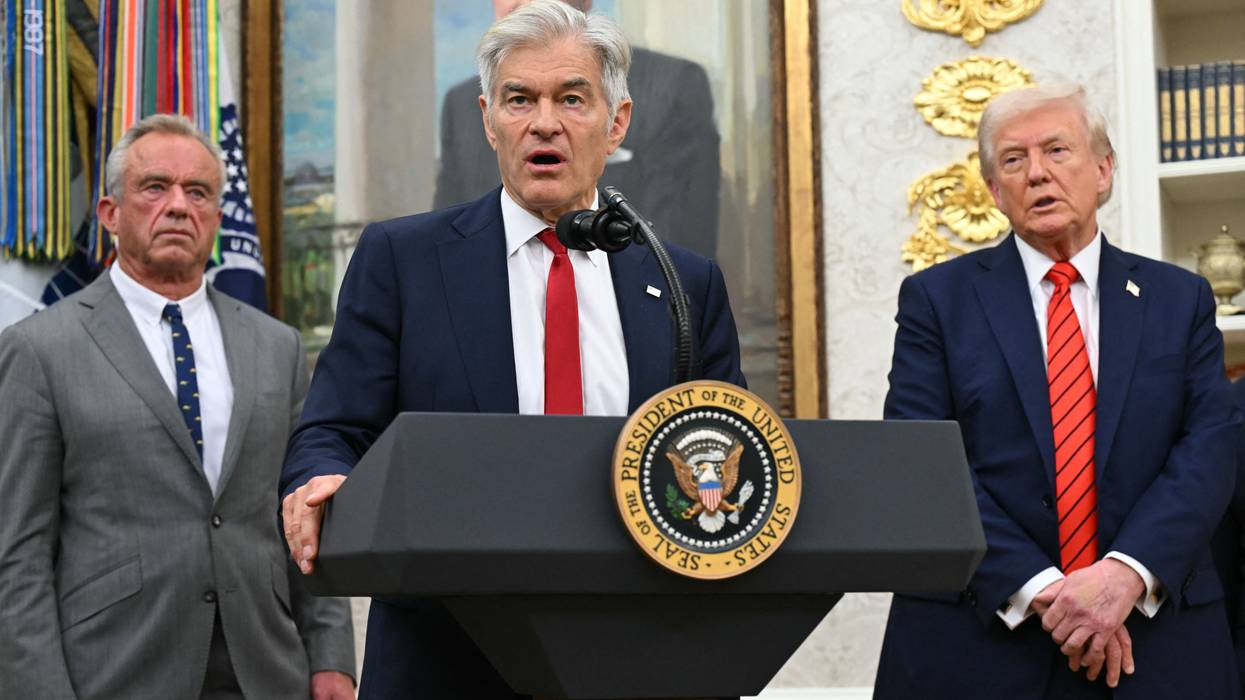February, 24 2016, 03:30pm EDT

Advocates to EPA: It's Time to Ban Organophosphate Pesticides
A diverse group of farmworker, child-safety and environmental advocates has sent a letter to the Environmental Protection Agency urging it to ban seven organophosphate pesticides that are currently under review. According to the EPA's own recently released risk assessments, the use of these neurotoxic pesticides may result in significant risks to people and animals that are exposed to them.
PORTLAND, Ore.
A diverse group of farmworker, child-safety and environmental advocates has sent a letter to the Environmental Protection Agency urging it to ban seven organophosphate pesticides that are currently under review. According to the EPA's own recently released risk assessments, the use of these neurotoxic pesticides may result in significant risks to people and animals that are exposed to them.
Organophosphates are widely used in agriculture on crops such as corn, cotton, watermelon and wheat. A recent study at the University of California at Berkeley found that an astonishing 87 percent of umbilical-cord blood samples tested had detectable levels of an organophosphate. Early childhood exposure to organophosphates has been linked to cognitive delay and attention deficit hyperactivity disorder, or ADHD. Organophosphates were also used as nerve agents in chemical warfare and have been linked to Gulf War syndrome, which causes fatigue, headaches, skin problems and breathing disorders.
"These pesticides pose unacceptably high risks to children, workers and wildlife, and really can't be used safely," said Nathan Donley, a scientist with the Center for Biological Diversity. "In this letter farmworkers, child-safety and consumer advocates have spoken with one voice, asking the EPA to ban these relics of our toxic past."
The agency's levels of concern were exceeded, in some cases by more than 1,000 percent, for many exposure scenarios for people who ingest pesticide-contaminated food and water. Further risks of concern were present for farmworkers for many different occupational handler scenarios.
In addition to effects on human health, organophosphates are also very dangerous to many species of wildlife. By the end of 2005, more than 1,440 bird-related incidents involving organophosphates had been recorded in North America, resulting in the deaths of more than 335,000 birds. Organophosphate use has also been linked to population declines of several amphibians in California, a state with heavy use of these pesticides.
"For organophosphates a high toxicity risk is not the exception, it's the rule. When risk of toxicity is exceeded by nearly every single metric in a risk assessment, it's a sure indication that these pesticides can't be used safely," said Donley.
This letter was submitted in response to the EPA's request for public comments on new releases of human-health and ecological risk assessments for chlorpyrifos-methyl, dicrotophos, dimethoate, ethoprop, profenofos, terbufos and tribufos.
The groups signing onto the letter include:
Alaska Community Action on Toxics
American Bird Conservancy
As You Sow
Beyond Pesticides
Beyond Toxics
California Rural Legal Assistance Foundation
Californians for Pesticide Reform
Center for Biological Diversity
Center for Effective Government
Center for Environmental Health
Center for Food Safety
Clean and Healthy New York
Coalition for Clean Air
Columbia Legal Services
Earthjustice
Environment America
Factory Farming Awareness Coalition
Farmworker Association of Florida
Farmworker Justice
Food & Water Watch
Friends of Farmworkers
Friends of the Earth
Global Workers Justice Alliance
Headwater LLC
Made Safe
Migrant Clinicians Network
New Mexico Center on Law and Poverty
Organic Consumers Association
Parents for a Safer Environment
Pesticide Action Network
Physicians for Social Responsibility
Texas RioGrande Legal Aid
The Environmental Justice Coalition for Water
Toxic Free North Carolina
Women's Voices for the Earth
Worker Justice Center of New York
Worksafe
At the Center for Biological Diversity, we believe that the welfare of human beings is deeply linked to nature — to the existence in our world of a vast diversity of wild animals and plants. Because diversity has intrinsic value, and because its loss impoverishes society, we work to secure a future for all species, great and small, hovering on the brink of extinction. We do so through science, law and creative media, with a focus on protecting the lands, waters and climate that species need to survive.
(520) 623-5252LATEST NEWS
GOP Moves to Fast-Track 'Dangerous' Assault on Treasured National Monument in Utah
"This wild landscape is quintessential southern Utah redrock country with its stunning geology, irreplaceable cultural resources, unique fossils, and wide-open spaces. All of that is at risk if this attack succeeds."
Feb 26, 2026
Republican US Sen. Mike Lee, a leading proponent of selling off the country's public lands, moved Wednesday to begin the process expediting an attack on the Grand Staircase-Escalante National Monument in his home state of Utah, drawing outrage from conservationists who vowed to pull out all the stops to protect the national treasure.
Lee kick-started the process by entering a recent Government Accountability Office (GAO) opinion into the congressional record. Last month, the GAO determined that a Biden-era management plan aimed at shielding Grand Staircase-Escalante constitutes a rule under the Congressional Review Act (CRA), which gives lawmakers a limited time to undo federal rules after they are finalized.
In the coming days, Lee and his allies are expected to introduce a resolution of disapproval under the CRA in an effort to roll back the monument management plan. CRA resolutions are privileged and not subject to the Senate's 60-vote filibuster, meaning Republicans could pass the measure without any Democratic support.
Rep. Celeste Maloy (R-Utah), who requested the GAO opinion, is leading the House effort to repeal the Grand Staircase-Escalante management plan.
Tom Delehanty, senior attorney with Earthjustice’s Rocky Mountain office, said in a statement Thursday that "the fate of our public lands, including our precious national monuments, should not be left to a handful of politicians who want to turn them over to industry."
"While this may be the first CRA attack on a national monument, it will not be the last if members of Congress on both sides of the aisle don’t stand up to oppose it," Delehanty warned. "Sen. Lee’s use of this arcane law would throw out years of planning by local officials, Tribes, and communities, setting a dangerous precedent on public land protection. Anyone who values our public lands and national monuments should take note.”
The legal director of the Southern Utah Wilderness Alliance, Steve Bloch, said the GOP's escalating attack on Grand Staircase-Escalante "is a call to action for Americans from across the nation."
"This wild landscape is quintessential southern Utah redrock country with its stunning geology, irreplaceable cultural resources, unique fossils, and wide-open spaces," said Bloch. "All of that is at risk if this attack succeeds and the monument management plan is undone. We intend to move heaven and earth to stop that from happening.”
During his first term in the White House, President Donald Trump launched a massive assault on Grand Staircase-Escalante, shrinking it by nearly 50%—a move that former President Joe Biden reversed.
But the Washington Post reported last year that the Trump administration has considered assailing the national monument yet again as part of a broader push to open the nation's public lands to commercial activity and industry exploitation.
Dan Ritzman, Sierra Club’s director of conservation, said Thursday that congressional Republicans' use of the CRA to gut protections for Grand Staircase-Escalante is "unprecedented" and "unlawful."
"Grand Staircase-Escalante National Monument is one of this country’s most treasured public landscapes, and the public has been involved from advocating for its protection to organizing its long-term management," said Ritzman. "Overturning this plan erases years of public engagement and Tribal consultation, and threatens certainty for everyone who uses and enjoys this iconic landscape.”
Keep ReadingShow Less
Trump Administration's New Healthcare Plans Could Slap Families With $31,000 Deductibles
"Nobody wants that product," said one healthcare expert of the Trump administration's proposed plans.
Feb 26, 2026
The Trump administration is proposing new regulations for healthcare plans purchased through Affordable Care Act exchanges that, on the surface, could offer patients lower monthly premiums.
However, the New York Times reported on Thursday that these plans would make up for the lower premiums by charging deductibles as high as $15,000 for individuals and $31,000 for families, meaning that people on these plans would have to pay significant up-front costs should they get sick before getting any benefit from having insurance.
For perspective, the Times noted that these deductibles would be "eight times the average for someone with job-based insurance."
Health experts who spoke with the Times were blunt about these plans' prospects for success.
"Nobody wants that product," Harvard health economist Amitabh Chandra said. "It’s going to be a really cheap product that nobody wants."
Dr. Joseph Betancourt, president of the Commonwealth Fund, told the Times that the plans being mulled by the administration would push greater assumption of risk onto patients and away from insurers.
"There's no doubt that we have an affordability crisis," he said. "As we move forward to shifting more of the burden to patients, there’s a chance to really exacerbate the crisis."
Katherine Hempstead, senior policy adviser for the Robert Wood Johnson Foundation, told the Times that the cheaper Trump plans are "normalizing hardship, and... normalizing catastrophe" by creating a form of health insurance that offers even less coverage than the cheapest plans available on the exchanges.
The high-deductible plans are being pushed by Medicare and Medicaid Administrator Mehmet Oz, who made headlines earlier this year by saying the goal of the Trump administration's healthcare policy was to have Americans be healthy enough so they could stay at work for at least an extra year before retiring.
"If we can get the average person... to work one more year in their whole lifetime, just stay in your workplace for one more year," Oz said during an interview on Fox Business, "that is worth about $3 trillion to the US GDP."
Democratic California Gov. Gavin Newsom, who is widely expected to seek the presidency in 2028, pounced on the report about the high-deductible plans.
"[Trump's] economic agenda is simple," Newsom wrote in a social media post, "force hard working families to pay more and give billionaires a tax break."
Johanna Maska, a former aide to President Barack Obama, expressed disbelief that this was Republicans' long-promised replacement plan for the ACA.
"A $31,000 deductible is unacceptable," she wrote. "This is the Republican long awaited plan? This is not healthcare that helps Americans."
Keep ReadingShow Less
'A Global Failure': UN Says 7,667 People Died or Went Missing on Migration Routes in 2025
"These deaths are not inevitable," said the International Organization for Migration's leader. "When safe pathways are out of reach, people are forced into dangerous journeys and into the hands of smugglers and traffickers."
Feb 26, 2026
A United Nations organization announced Thursday that at least 7,667 people died or went missing on migration routes worldwide last year—or around 21 migrants per day—but "the real toll is likely higher."
"Sea crossings remained among the deadliest routes," according to the International Organization for Migration. IOM found that at least 2,185 people died or went missing in the Mediterranean Sea, and another 1,214 on the Western Africa/Atlantic route toward the Canary Islands.
Nearly two months into a new year, the trend in the Mediterranean has persisted. IOM pointed to the "unprecedented number of migrant deaths in the first two months of 2026, with 606 recorded" as of Tuesday.
"The continued loss of life on migration routes is a global failure we cannot accept as normal," said IOM Director General Amy Pope in a statement. "These deaths are not inevitable. When safe pathways are out of reach, people are forced into dangerous journeys and into the hands of smugglers and traffickers."
"We must act now to expand safe and regular routes, and ensure people in need can be reached and protected, regardless of their status," Pope asserted.
Despite such calls, the European Union has worked to curb migration to the continent with its Pact on Migration and Asylum—which has been condemned as a "bow to right-wing extremists and fascists," and is set to take effect next June—and the related "return regulation" that the Council of the EU finalized in December.
"The EU is legitimizing offshore prisons, racial profiling, and child detention in ways we have never seen," Sarah Chander, director at the Equinox Initiative for Racial Justice, said of the council's move last year. "Instead of finding ways to ensure safety and protection for everybody, the EU is pushing a punishment regime for migrants, which will help no one."
Reporting on the new IOM data, Politico noted Thursday:
The EU's priority now is "about bringing illegal arrivals to a minimum and keeping those numbers there," Migration Commissioner Magnus Brunner said when presenting the bloc's migration strategy in January.
That's "not as an end in itself," he said, but reduces pressure on EU countries, prevents abuse, reinforces people's trust in the EU, and helps save lives. "Any smuggling trip prevented is potentially a life which we save."
As a next step, the EU "must address migration along the whole route," including by ensuring protection for people in need "closer to the point of departure," Brunner said.
Meanwhile, in the Americas, US President Trump returned to power in early 2025, having campaigned on a promise of mass deportations. He's aimed to deliver on the pledge by deploying federal agents to various cities, where they have terrorized immigrants and citizens alike with civil rights violations and, in some cases, fatal shootings.
IOM only recorded 409 deaths in the Americas last year, the lowest annual total since its data collection began in 2014. The organization said that "this is likely due to fewer people taking dangerous irregular pathways, such as crossing the Darien Jungle or the US-Mexico border. However, lags in reporting from officials means that the figures for 2025 in the Americas likely will not be finalized until mid-2026."
The overall figure is also down, from nearly 9,200 in 2024. However, IOM explained that "the decline reflects fewer people attempting dangerous irregular migration routes, particularly in the Americas, but is also due to restricted access to information and funding constraints for humanitarian actors documenting migrant deaths on key routes."
IOM called for "urgent funding to strengthen data collection to better guide the humanitarian system in delivering lifesaving responses."
Reuters highlighted that "the Geneva‑based organization is among several aid groups hit by major US funding cuts, forcing it to scale back or close programs in ways it says will severely impact migrants."
Keep ReadingShow Less
Most Popular



